28 start with B start with B
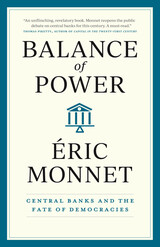
Two decades of financial crises have dramatically expanded central banks’ powers. In 2008, and then again in 2020, unelected banking officials found themselves suddenly responsible for the public welfare—not just because it was necessary but based on an idea that their independence from political systems would insulate them from the whims of populism. Now, as international crises continue and the scope of monetary interventions grows in response, these bankers have become increasingly powerful.
In Balance of Power, economist and historian Éric Monnet charts the rise of central banks as the nominally independent—but unavoidably political—superpowers of modern societies. This trajectory, Monnet argues, is neither inevitable nor unstoppable. By embracing the political natures of today’s central banks, we can construct systems of accountability for how they interact with states and societies. Monnet shows that this effort will do more than guard against unjust power; it will put the banks to work for greater, more democratic ends.
With existential challenges looming and the work of the Federal Reserve and European Central Bank more important than ever, Balance of Power offers a trenchant case for what this century’s central banks can—and must—become.


Late one night in July 1832,Martin Van Buren rushed to the White House where he found an ailing President Andrew Jackson weakened but resolute. Thundering against his political antagonists, Jackson bellowed: “The Bank, Mr. Van Buren, is trying to kill me, but I shall kill it!”With those famous words, Jackson formally declared “war” against the Second Bank of the United States and its president Nicholas Biddle. The Bank of the United States, which held the majority of Federal monies, had been established as a means of centralizing and stabilizing American currency and the economy, particularly during the country’s vulnerable early years. Jackson and his allies viewed the bank as both elitist and a threat to states’ rights. Throughout his first term, Jackson had attacked the bank viciously but failed to take action against the institution. Congress’ decision to recharter the bank forced Jackson to either make good on his rhetoric and veto the recharter or sign the recharter bill and be condemned as a hypocrite.
In The Bank War: Andrew Jackson, Nicholas Biddle, and the Fight for American Finance, historian Paul Kahan explores one of the most important and dramatic events in American political and economic history, from the idea of centralized banking and the First Bank of the United States to Jackson’s triumph, the era of “free banking,” and the creation of the Federal Reserve System. Relying on a range of primary and secondary source material, the book also shows how the Bank War was a manifestation of the debates that were sparked at the Constitutional Convention—the role of the executive branch and the role of the federal government in American society—debates that endure to this day as philosophical differences that often divide the United States.
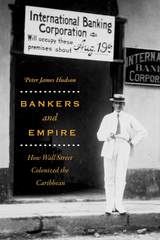
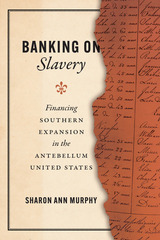
It’s now widely understood that the fullest expression of nineteenth-century American capitalism was found in the structures of chattel slavery. It’s also understood that almost every other institution and aspect of life then was at least entangled with—and often profited from—slavery’s perpetuation. Yet as Sharon Ann Murphy shows in her powerful and unprecedented book, the centrality of enslaved labor to banking in the antebellum United States is far greater than previously thought.
Banking on Slavery sheds light on precisely how the financial relationships between banks and slaveholders worked across the nineteenth-century South. Murphy argues that the rapid spread of slavery in the South during the 1820s and ’30s depended significantly upon southern banks’ willingness to financialize enslaved lives, with the use of enslaved individuals as loan collateral proving central to these financial relationships. She makes clear how southern banks were ready—and, in some cases, even eager—to alter time-honored banking practices to meet the needs of slaveholders. In the end, many of these banks sacrificed themselves in their efforts to stabilize the slave economy. Murphy also details how banks and slaveholders transformed enslaved lives from physical bodies into abstract capital assets. Her book provides an essential examination of how our nation’s financial history is more intimately intertwined with the dehumanizing institution of slavery than scholars have previously thought.
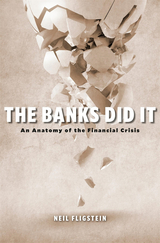
A comprehensive account of the rise and fall of the mortgage-securitization industry, which explains the complex roots of the 2008 financial crisis.
More than a decade after the 2008 financial crisis plunged the world economy into recession, we still lack an adequate explanation for why it happened. Existing accounts identify a number of culprits—financial instruments, traders, regulators, capital flows—yet fail to grasp how the various puzzle pieces came together. The key, Neil Fligstein argues, is the convergence of major US banks on an identical business model: extracting money from the securitization of mortgages. But how, and why, did this convergence come about?
The Banks Did It carefully takes the reader through the development of a banking industry dependent on mortgage securitization. Fligstein documents how banks, with help from the government, created the market for mortgage securities. The largest banks—Countrywide Financial, Bear Stearns, Citibank, and Washington Mutual—soon came to participate in every aspect of this market. Each firm originated mortgages, issued mortgage-backed securities, sold those securities, and, in many cases, acted as their own best customers by purchasing the same securities. Entirely reliant on the throughput of mortgages, these firms were unable to alter course even when it became clear that the market had turned on them in the mid-2000s.
With the structural features of the banking industry in view, the rest of the story falls into place. Fligstein explains how the crisis was produced, where it spread, why regulators missed the warning signs, and how banks’ dependence on mortgage securitization resulted in predatory lending and securities fraud. An illuminating account of the transformation of the American financial system, The Banks Did It offers important lessons for anyone with a stake in avoiding the next crisis.

In the 1980s, troubled Americans saw interest rates in the United States climb to an alltime high, unemployment grow to over 10 percent, the federal deficit reach near monumental proportions, and the world economy as a whole fall stagnant.
Why did a once booming world economy give way to stagflation? Economist W. W. Rostow finds the roots of the problem in the phenomenon he terms the Barbaric Counter-Revolution—the effort to wring inflation out of the economic system by the rigorous application of a restricted rate of increase in the money supply. This policy was launched by the Carter administration in October 1979, reinforced by President Reagan in mid 1980, and abandoned in August 1982. In the end, it provided the United States with no mechanism for rapid recovery that did not bring with it a return to high interest rates, resumed inflation, and, soon, another recession.
In what he terms a Civilized Synthesis, Rostow sets forth a series of new policies that would permit rapid, sustained growth with inflation under control. He argues that fiscal and monetary policy must be joined by an incomes policy that would gear the rate of increase of wages and salaries to the average rate of increase in productivity. He explores how this could be accomplished within the context of American politics and existing institutions. Finally, Rostow identifies four directions for investment that, together, would yield economic and social benefits.
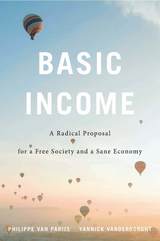
“Powerful as well as highly engaging—a brilliant book.”
—Amartya Sen
A Times Higher Education Book of the Week
It may sound crazy to pay people whether or not they’re working or even looking for work. But the idea of providing an unconditional basic income to everyone, rich or poor, active or inactive, has long been advocated by such major thinkers as Thomas Paine, John Stuart Mill, and John Kenneth Galbraith. Now, with the traditional welfare state creaking under pressure, it has become one of the most widely debated social policy proposals in the world. Basic Income presents the most acute and fullest defense of this radical idea, and makes the case that it is our most realistic hope for addressing economic insecurity and social exclusion.
“They have set forth, clearly and comprehensively, what is probably the best case to be made today for this form of economic and social policy.”
—Benjamin M. Friedman, New York Review of Books
“A rigorous analysis of the many arguments for and against a universal basic income, offering a road map for future researchers.”
—Wall Street Journal
“What Van Parijs and Vanderborght bring to this topic is a deep understanding, an enduring passion and a disarming optimism.”
—Steven Pearlstein, Washington Post
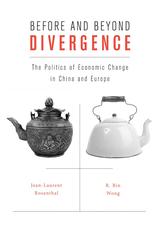
China has reemerged as a powerhouse in the global economy, reviving a classic question in economic history: why did sustained economic growth arise in Europe rather than in China?
Many favor cultural and environmental explanations of the nineteenth-century economic divergence between Europe and the rest of the world. This book, the product of over twenty years of research, takes a sharply different tack. It argues that political differences which crystallized well before 1800 were responsible both for China’s early and more recent prosperity and for Europe’s difficulties after the fall of the Roman Empire and during early industrialization.
Rosenthal and Wong show that relative prices matter to how economies evolve; institutions can have a large effect on relative prices; and the spatial scale of polities can affect the choices of institutions in the long run. Their historical perspective on institutional change has surprising implications for understanding modern transformations in China and Europe and for future expectations. It also yields insights in comparative economic history, essential to any larger social science account of modern world history.

Sartori weaves the narrative of Bengal’s embrace of culturalism into a worldwide history of the concept, from its origins in eighteenth-century Germany, through its adoption in England in the early 1800s, to its appearance in distinct local guises across the non-Western world. The impetus for the concept’s dissemination was capitalism, Sartori argues, as its spread across the globe initiated the need to celebrate the local and the communal. Therefore, Sartori concludes, the use of the culture concept in non-Western sites was driven not by slavish imitation of colonizing powers, but by the same problems that repeatedly followed the advance of modern capitalism. This remarkable interdisciplinary study will be of significant interest to historians and anthropologists, as well as scholars of South Asia and colonialism.
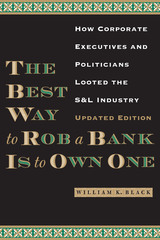
In this expert insider’s account of the savings and loan debacle of the 1980s, William Black lays bare the strategies that corrupt CEOs and CFOs—in collusion with those who have regulatory oversight of their industries—use to defraud companies for their personal gain. Recounting the investigations he conducted as Director of Litigation for the Federal Home Loan Bank Board, Black fully reveals how Charles Keating and hundreds of other S&L owners took advantage of a weak regulatory environment to perpetrate accounting fraud on a massive scale. In the new afterword, he also authoritatively links the S&L crash to the business failures of 2008 and beyond, showing how CEOs then and now are using the same tactics to defeat regulatory restraints and commit the same types of destructive fraud.
Black uses the latest advances in criminology and economics to develop a theory of why “control fraud”—looting a company for personal profit—tends to occur in waves that make financial markets deeply inefficient. He also explains how to prevent such waves. Throughout the book, Black drives home the larger point that control fraud is a major, ongoing threat in business that requires active, independent regulators to contain it. His book is a wake-up call for everyone who believes that market forces alone will keep companies and their owners honest.
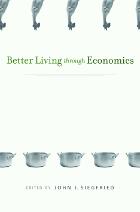
Better Living Through Economics consists of twelve case studies that demonstrate how economic research has improved economic and social conditions over the past half century by influencing public policy decisions.
Economists were obviously instrumental in revising the consumer price index and in devising auctions for allocating spectrum rights to cell phone providers in the 1990s. But perhaps more surprisingly, economists built the foundation for eliminating the military draft in favor of an all-volunteer army in 1973, for passing the Earned Income Tax Credit in 1975, for deregulating airlines in 1978, for adopting the welfare-to-work reforms during the Clinton administration, and for implementing the Pension Reform Act of 2006 that allowed employers to automatically enroll employees in a 401(k). Other important policy changes resulting from economists’ research include a new approach to monetary policy that resulted in moderated economic fluctuations (at least until 2008!), the reduction of trade impediments that allows countries to better exploit their natural advantages, a revision of antitrust policy to focus on those market characteristics that affect competition, an improved method of placing new physicians in hospital residencies that is more likely to keep married couples in the same city, and the adoption of tradable emissions rights which has improved our environment at minimum cost.
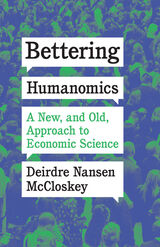
Economic historian Deirdre Nansen McCloskey has distinguished herself through her writing on the Great Enrichment and the betterment of the poor—not just materially but spiritually. In Bettering Humanomics she continues her intellectually playful yet rigorous analysis with a focus on humans rather than the institutions. Going against the grain of contemporary neo-institutional and behavioral economics which privilege observation over understanding, she asserts her vision of “humanomics,” which draws on the work of Bart Wilson, Vernon Smith, and most prominently, Adam Smith. She argues for an economics that uses a comprehensive understanding of human action beyond behaviorism.
McCloskey clearly articulates her points of contention with believers in “imperfections,” from Samuelson to Stiglitz, claiming that they have neglected scientific analysis in their haste to diagnose the ills of the system. In an engaging and erudite manner, she reaffirms the global successes of market-tested betterment and calls for empirical investigation that advances from material incentives to an awareness of the human within historical and ethical frameworks. Bettering Humanomics offers a critique of contemporary economics and a proposal for an economics as a better human science.
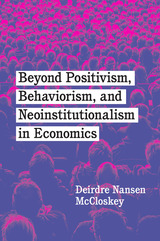
In Beyond Positivism, Behaviorism, and Neoinstitutionalism in Economics, Deirdre Nansen McCloskey zeroes in on the authoritarian cast of recent economics, arguing for a re-focusing on the liberated human. The behaviorist positivism fashionable in the field since the 1930s treats people from the outside. It yielded in Williamson and North a manipulative neo-institutionalism. McCloskey argues that institutions as causes are mainly temporary and intermediate, not ultimate. They are human-made, depending on words, myth, ethics, ideology, history, identity, professionalism, gossip, movies, what your mother taught you. Humans create conversations as they go, in the economy as in the rest of life.
In engaging and erudite prose, McCloskey exhibits in detail the scientific failures of neo-institutionalism. She proposes a “humanomics,” an economics with the humans left in. Humanomics keeps theory, quantification, experiment, mathematics, econometrics, though insisting on more true rigor than is usual. It adds what can be learned about the economy from history, philosophy, literature, and all the sciences of humans. McCloskey reaffirms the durability of “market-tested innovation” against the imagined imperfections to be corrected by a perfect government. With her trademark zeal and incisive wit, she rebuilds the foundations of economics.

For many years, China and India have been powerfully shaped by both transnational and subnational circulatory forces. This edited volume explores these local and global influences as they play out in the contemporary era. The analysis focuses on four intersecting topics: labor relations; legal reform and rights protest; public goods provision; and transnational migration and investment. The eight substantive chapters and introduction share a common perspective in arguing that distinctions in regime type (“democracy” versus “dictatorship”) alone offer little insight into critical differences and similarities between these Asian giants in terms of either policies or performance. A wide variety of subnational and transnational actors, from municipal governments to international organizations, and from local NGO activists to a far-flung diaspora, have been—and will continue to be—decisive.
The authors approach China and India through a strategy of “convergent comparison,” in which they investigate temporal and spatial parallels at various critical junctures, at various levels of the political system, and both inside and outside the territorial confines of the nation-state. The intensified globalization of recent decades only heightens the need to view state initiatives against such a wider canvas.

This is the first major study in Chinese business history based largely on business's own records. It focuses on the battle for the cigarette market in early twentieth-century China between the British-American Tobacco Company, based in New York and London, and its leading Chinese rival, Nanyang Brothers Tobacco Company, whose headquarters were in Hong Kong and Shanghai.
From its founding in 1902, the British-American Tobacco Company maintained a lucrative monopoly of the market until 1915, when Nanyang entered China and extended tis operations into the country's major markets despite the use of aggressive tactics against it. Both companies grew rapidly during the 1920s, and competition between them reached its peak, but by 1930 Nanyang weakened, bringing an end to serious commercial rivalry. Though less competitive, both companies continued to trade in China until their Sino-foreign rivalry ended altogether with the founding of the People's Republic in 1949.
Debate over international commercial rivalries has often been conducted broadly in terms of imperialist exploitation and economic nationalism. This study shows the usefulness and limitations of these terms for historical purposes and contributes to the separate but related debate over the significance of entrepreneurial innovation in Chinese economic history. By analyzing the foreign Chinese companies' business practices and by describing their involvement in diplomatic incidents, boycotts, strikes, student protests, relations with peasant tobacco growers, dealings with the Kuomintang and Chinese Communist Party, and a host of other activities, the author brings to light the roles that big businesses played not only in China's economy but also in its politics, society, and foreign affairs.

Throughout the fourteenth century AD/eighth century H, waves of plague swept out of Central Asia and decimated populations from China to Iceland. So devastating was the Black Death across the Old World that some historians have compared its effects to those of a nuclear holocaust. As countries began to recover from the plague during the following century, sharp contrasts arose between the East, where societies slumped into long-term economic and social decline, and the West, where technological and social innovation set the stage for Europe's dominance into the twentieth century. Why were there such opposite outcomes from the same catastrophic event?
In contrast to previous studies that have looked to differences between Islam and Christianity for the solution to the puzzle, this pioneering work proposes that a country's system of landholding primarily determined how successfully it recovered from the calamity of the Black Death. Stuart Borsch compares the specific cases of Egypt and England, countries whose economies were based in agriculture and whose pre-plague levels of total and agrarian gross domestic product were roughly equivalent. Undertaking a thorough analysis of medieval economic data, he cogently explains why Egypt's centralized and urban landholding system was unable to adapt to massive depopulation, while England's localized and rural landholding system had fully recovered by the year 1500.

American taxation is unfair, and it is most unfair to the very people who critically need its support. Not only do taxpayers with fewer resources—less wealth, power, and land—pay more than the well-off, but they are forced to fight for their rights within an unjust system that undermines any attempts to improve their position or economic standing. In The Black Tax, Andrew W. Kahrl reveals the shocking history and ruinous consequences of inequitable and predatory tax laws in this country—above all, widespread and devastating racial dispossession.
Throughout the twentieth century, African Americans acquired substantial amounts of property nationwide. But racist practices, obscure processes, and outright theft diminished their holdings and their power. Of these, Kahrl shows, few were more powerful, or more quietly destructive, than property taxes. He examines all the structural features and hidden traps within America’s tax system that have forced Black Americans to pay more for less and stripped them of their land and investments, and he reveals the staggering cost. The story of America’s now enormous concentration of wealth at the top—and the equally enormous absence of wealth among most Black households—has its roots here.
Kahrl exposes the painful history of these practices, from Reconstruction up to the present, describing how discrimination continues to take new forms, even as people continue to fight for their rights, their assets, and their power. If you want to understand the extreme economic disadvantages and persistent racial inequalities that African American households continue to face, there is no better starting point than The Black Tax.
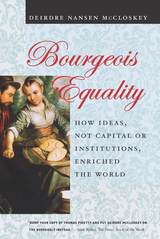
Why? Most economists—from Adam Smith and Karl Marx to Thomas Piketty—say the Great Enrichment since 1800 came from accumulated capital. McCloskey disagrees, fiercely. “Our riches,” she argues, “were made not by piling brick on brick, bank balance on bank balance, but by piling idea on idea.” Capital was necessary, but so was the presence of oxygen. It was ideas, not matter, that drove “trade-tested betterment.” Nor were institutions the drivers. The World Bank orthodoxy of “add institutions and stir” doesn’t work, and didn’t. McCloskey builds a powerful case for the initiating role of ideas—ideas for electric motors and free elections, of course, but more deeply the bizarre and liberal ideas of equal liberty and dignity for ordinary folk. Liberalism arose from theological and political revolutions in northwest Europe, yielding a unique respect for betterment and its practitioners, and upending ancient hierarchies. Commoners were encouraged to have a go, and the bourgeoisie took up the Bourgeois Deal, and we were all enriched.
Few economists or historians write like McCloskey—her ability to invest the facts of economic history with the urgency of a novel, or of a leading case at law, is unmatched. She summarizes modern economics and modern economic history with verve and lucidity, yet sees through to the really big scientific conclusion. Not matter, but ideas. Big books don’t come any more ambitious, or captivating, than Bourgeois Equality.
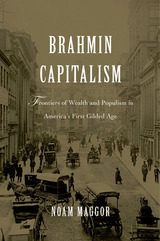
Tracking the movement of finance capital toward far-flung investment frontiers, Noam Maggor reconceives the emergence of modern capitalism in the United States. Brahmin Capitalism reveals the decisive role of established wealth in the transformation of the American economy in the decades after the Civil War, leading the way to the nationally integrated corporate capitalism of the twentieth century.
Maggor’s provocative history of the Gilded Age explores how the moneyed elite in Boston—the quintessential East Coast establishment—leveraged their wealth to forge transcontinental networks of commodities, labor, and transportation. With the decline of cotton-based textile manufacturing in New England and the abolition of slavery, these gentleman bankers traveled far and wide in search of new business opportunities and found them in the mines, railroads, and industries of the Great West. Their investments spawned new political and social conflict, in both the urbanizing East and the expanding West. In contests that had lasting implications for wealth, government, and inequality, financial power collided with more democratic visions of economic progress.
Rather than being driven inexorably by technologies like the railroad and telegraph, the new capitalist geography was a grand and highly contentious undertaking, Maggor shows, one that proved pivotal for the rise of the United States as the world’s leading industrial nation.
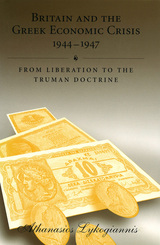

The performance of the British economy in the critical decades before 1914 is the subject of much scholarly debate. This first modern history of the British shipbuilding industry between 1870 and 1914 examines activities and attitudes of the shipbuilders in the context of this controversy over the quality of British entrepreneurship.
The authors consider the effectiveness of marketing practices, the rate of technological change, the degree to which ever-scarcer natural resources impose a constraint on growth, the general economic rationality of entrepreneurs, and, above all, the consequences of management decisions. After carefully weighing all evidence, the authors conclude that the general level of managerial performance was high, and in contrast to other sectors of heavy industry, British shipbuilders were able to maintain their dominant position.

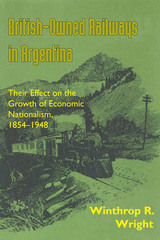
During the nineteenth century, British-owned railways grew under the protection of an Argentine ruling elite that considered railways both instruments and symbols of progress. Under this program of support for foreign enterprise, Argentina had by 1914 built the largest railway network in Latin America.
During the first decades of the twentieth century, the railways were successful in following a policy of calculated disregard for Argentine interests in general. However, following the end of World War I, the British economic empire began to decline and Argentine economic nationalism grew. A number of popularistic political movements incorporated economic nationalism into their platforms, and even among the ruling elite there were signs of increasing nationalistic sentiment.
Although most studies of economic nationalism have emphasized the importance of the middle-class Radical party in the rise of xenophobia, Winthrop R. Wright's study shows that antiforeign economic nationalism was not entirely a reaction to the conservative elite. Between 1932 and 1938 the nationalistic programs of General Agustin Justo's government—basically a conservative regime—led the British interests to decide to sell their holdings. The British govemment had arrived at a position of supporting the economic withdrawal of the large British-owned firms long before Juan D. Perón appeared on the political scene.
Perón combined traditional Argentine economic nationalism with his own scheme to gain power over all elements in Argentina. His solution to the railway problem, although more dramatically executed, did not differ greatly from that of the conservative Justo. Perón purchased the railways outright in 1947–1948, but his use of nationalism was in reality covering his own inability to outbargain Britain and the United States following the conclusion of World War II.
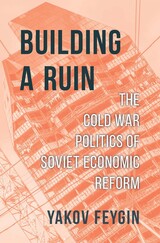
A masterful account of the global Cold War’s decisive influence on Soviet economic reform, and the national decay that followed.
What brought down the Soviet Union? From some perspectives the answers seem obvious, even teleological—communism was simply destined to fail. When Yakov Feygin studied the question, he came to another conclusion: at least one crucial factor was a deep contradiction within the Soviet political economy brought about by the country’s attempt to transition from Stalinist mass mobilization to a consumer society.
Building a Ruin explores what happened in the Soviet Union as institutions designed for warfighting capacity and maximum heavy industrial output were reimagined by a new breed of reformers focused on “peaceful socioeconomic competition.” From Khrushchev on, influential schools of Soviet planning measured Cold War success in the same terms as their Western rivals: productivity, growth, and the availability of abundant and varied consumer goods. The shift was both material and intellectual, with reformers taking a novel approach to economics. Instead of trumpeting their ideological bona fides and leveraging their connections with party leaders, the new economists stressed technical expertise. The result was a long and taxing struggle for the meaning of communism itself, as old-guard management cadres clashed with reformers over the future of central planning and the state’s relationship to the global economic order.
Feygin argues that Soviet policymakers never resolved these tensions, leading to stagnation, instability, and eventually collapse. Yet the legacy of reform lingers, its factional dynamics haunting contemporary Russian politics.
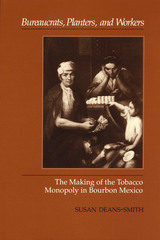
Honorable Mention, Bolton Memorial Prize, Conference on Latin American History
A government monopoly provides an excellent case study of state-society relationships. This is especially true of the tobacco monopoly in colonial Mexico, whose revenues in the later half of the eighteenth century were second only to the silver tithe as the most valuable source of government income. This comprehensive study of the tobacco monopoly illuminates many of the most important themes of eighteenth-century Mexican social and economic history, from issues of economic growth and the supply of agricultural credit to rural relations, labor markets, urban protest and urban workers, class formation, work discipline, and late colonial political culture.
Drawing on exhaustive research of previously unused archival sources, Susan Deans-Smith examines a wide range of new questions. Who were the bureaucrats who managed this colonial state enterprise and what policies did they adopt to develop it? How profitable were the tobacco manufactories, and how rational was their organization? What impact did the reorganization of the tobacco trade have upon those people it affected most—the tobacco planters and tobacco workers?
This research uncovers much that was not previously known about the Bourbon government's management of the tobacco monopoly and the problems and limitations it faced. Deans-Smith finds that there was as much continuity as change after the monopoly's establishment, and that the popular response was characterized by accommodation, as well as defiance and resistance. She argues that the problems experienced by the monopoly at the beginning of the nineteenth century did not originate from any simmering, entrenched opposition. Rather, an emphasis upon political stability and short-term profits prevented any innovative reforms that might have improved the monopoly's long-term performance and productivity.
With detailed quantitative data and rare material on the urban working poor of colonial Mexico, Bureaucrats, Planters, and Workers will be important reading for all students of social, economic, and labor history, especially of Mexico and Latin America.

Business As Usual reveals how American capitalism has been promoted in the most ephemeral of materials: public service announcements, pamphlets, educational films, and games—what Caroline Jack calls “sponsored economic education media.” These items, which were funded by corporations and trade groups who aimed to “sell America to Americans,” found their way into communities, classrooms, workplaces, and onto the airwaves, where they promoted ideals of “free enterprise” under the cloaks of public service and civic education. They offered an idealized vision of US industrial development as a source of patriotic optimism, framed business management imperatives as economic principles, and conflated the privileges granted to corporations by the law with foundational political rights held by individuals. This rhetoric remains dominant—a harbinger of the power of disinformation that so besets us today. Jack reveals the funding, production, and distribution that together entrenched a particular vision of corporate responsibility—and, in the process, shut out other hierarchies of value and common care.

Goes beyond institutional history to concentrate on commercial and social matters
The author’s findings imply that Jewish immigrants to the South in the first half of the 19th century came from particular locales with similar social, economic, and religious backgrounds, and they chose to live in the South because of those traditions. The experience of Jews with commercial capitalism, rather than landowning, in agricultural societies, gave the Jews of Louisiana a comparable niche in America, and they participated in the commercial aspects of a regional economy based on agricultural production. Commercial and family connections with other Jewish groups facilitated their development into a settled community. In growth and decline, Jewish communities in Louisiana and elsewhere became permanent features of the landscape and influenced, and were influenced, by the areas in which they lived.
READERS
Browse our collection.
PUBLISHERS
See BiblioVault's publisher services.
STUDENT SERVICES
Files for college accessibility offices.
UChicago Accessibility Resources
home | accessibility | search | about | contact us
BiblioVault ® 2001 - 2024
The University of Chicago Press









